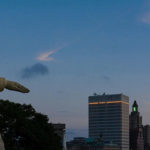Election years present a challenge to Christian conscience: How should you express your faith with your ballot?
This winter and spring, Republican evangelicals and Catholics will confront an age-old version of that question. Will they entrust the country to a candidate whose religious beliefs they might describe as unorthodox, at best, and perhaps—if they concur with an infamous pronouncement by a Dallas pastor—cultish? Can they pull the lever for a Mormon, Mitt Romney or Jon Huntsman? Depending on how the primaries unfold, the broader electorate may ask themselves those questions.
The "Mormon issue" echoes the furious religious-political debate prompted by John Kennedy's presidential candidacy in 1960. Back then, widespread concern that the young war hero and Massachusetts senator might become the United States' first Roman Catholic president flooded the Baptist Standard. Many Baptists joined multitudes of non-Catholics in opposing Kennedy. They feared a Catholic president would take his marching orders from the papal hierarchy and obliterate church-state separation and religious liberty in America. They based their logic on the Catholic idea that salvation is dispensed through the church. So, a Catholic layman—even the president—would be required to obey the pope for fear of eternal damnation.
Standard Editor E.S. James wrote extensively about the election. Following his own convictions regarding church-state separation, James refused to endorse either candidate. But he exegeted the issue, insisting presidential loyalty to the U.S. Constitution should supercede loyalty to the papacy.
"There must be renunciation of allegiance to the foreign religio-political state at the Vatican, and there must be declaration of freedom of the clergy by American Catholic citizens," he stressed. "If that were done, we know of no reason why a Roman Catholic should not have the support of voters of all faiths." Just before the election, James reported: Catholic Kennedy "affirms again and again that he is definitely committed to the principle of separation of church and state, and that he is opposed to federal aid to parochial education or the appointment of an envoy to the Vatican."
Kennedy's Quaker opponent, Richard Nixon, "is vague, evasive and ambiguous about aid to parochial schools" and "favors federal aid to both public and private schools of higher learning." Ultimately, enough non-Catholics took Kennedy at his word to hand him the presidency.
In 2012, the issue isn't so much about candidates' fealty to the Mormon hierarchy as assent to ideas most Americans find unusual. Non-Mormons are asking (popularized, over-simplified and at times inaccurate) questions: Should a person whose beliefs involve special revelation written on tablets of gold and questionable anthropology lead the nation? Could a candidate whose thinking includes sacred underwear and the possibility of divinity provide sound leadership?
To be fair, secular commentators have noted orthodox Christian doctrine seems similarly wacky and illogical to millions of unbelievers. But since Mormonism stands outside the mainstream of American religion, the questions for Mormon candidates persist.
Fortunately, James' template for evaluating candidates is as valid today as it was more than a half-century ago. He recognized politicians' decisions are shaped by faith, but he acknowledged the Constitution guarantees they must not be limited by a religious test for office. Since governing essentially is a secular task, loyalty to the Constitution and commitment to church-state separation provide sufficient protection to ward off alarmists' fears.
Sign up for our weekly edition and get all our headlines in your inbox on Thursdays
Ironically, ultra-conservative evangelical Christians, who often confuse their personal convictions with public policy, pose the greater threat to religious liberty today. That's all the more reason voters in this election cycle should evaluate candidates on three vital characteristics—character, competence and the clarity of their positions. That is fodder for another editorial, which we'll have time to explore later.
This election year is young. Very young.
—Marv Knox is editor of the Baptist Standard. Visit his blog at www.baptiststandard.com .














We seek to connect God’s story and God’s people around the world. To learn more about God’s story, click here.
Send comments and feedback to Eric Black, our editor. For comments to be published, please specify “letter to the editor.” Maximum length for publication is 300 words.